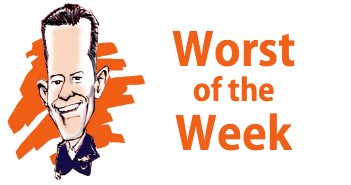WOTW looks at how recent comments from Verizon on unlimited data appear limited in scope
Hello! And welcome to our Friday column, Worst of the Week. There’s a lot of nutty stuff that goes on in this industry, so this column is a chance for us at RCRWireless.com to rant and rave about whatever rubs us the wrong way. We hope you enjoy it!
And without further ado:
This week provided stark contrasts and views on the value of unlimited cellular data plans.
Speaking at always popular investor conferences, executives from Verizon Communications and AT&T were both asked about their respective plans for such offerings. And, those answers could not have been more diametrically opposed.
First, Verizon CFO Fran Shammo again nixed any plans for the company’s wireless division to relaunch an unlimited cellular data plan, claiming such models do not “work in an LTE environment.” As many may remember, Verizon Wireless stopped offering “unlimited” data to new customers back in 2011, and last year jacked prices 66% for customers that held onto those plans.
Now, in first tackling the basics of Shammo’s comment, perhaps Verizon Wireless may need to reconsider its vendor and network partners. It seems all three of its largest rivals are able to make unlimited data work logistically in an LTE environment just fine.
Of course, I think we all know Shammo’s comments were probably more about the monetary challenges in supporting unlimited data plans. This would seem to be connected with the network resources needed to support what is often referred to as the rogue 5% of customers that take the “unlimited” part of unlimited data seriously.
For Verizon Wireless, 5% of its customer base is something like 5 million customers, give-or-take, and thus I could see where needing to build out a network with sufficient resources to handle that many customers going to town on streaming data could prove to be a financial challenge.
But, Verizon is also a company that last year managed to pocket $18 billion in profits on $130 billion in revenues, so obviously the monetary scale is somewhat distorted.
By contrast, AT&T CFO John Stephens this week, speaking at the same investor conference, confidently noted 2 million customers over the past two months had signed up for its recently relaunched unlimited cellular data plan. That data plan is priced at $100 per month for the first line of service, second and third lines of service can be added for $40 per month and a fourth line is free.
More importantly, AT&T tied the unlimited data plan to customers also having to subscribe to one of its video services, either DirecTV or U-verse. Stephens noted the connection leads to customers paying between $300 and $400 per month for the combined offerings and is expected to also lead to lower churn across both platforms.
(And, just for fun, smaller rivals T-Mobile US and Sprint both continue to support unlimited cellular data plans, showing that indeed unlimited data does indeed work in the LTE environment.)
Obviously, Verizon and AT&T have very different service offerings, network architectures and business models, so linking the ability of one to do something with the other is not really fair. But, AT&T was one of the first domestic carriers to discard unlimited data due to network constraints, yet through some wheeling and dealing has been able to bring the offer back in a way that not only is great from a marketing prospective, but looks to be a boon for a number of its service platforms.
So, when Shammo says unlimited data does not work in the LTE environment, he is most certainly speaking just from a Verizon perspective. However, in seeing how AT&T is making it work it would seem Verizon is just not looking deep enough into its portfolio to make it work. I know Verizon is not playing with the same service offering depth as AT&T at the moment, but it does have FiOS, its Go90 video platform and its vehicle telematics services that would seem to be prime candidates for a boost from unlimited cellular data.
I know Verizon has never been considered the most creative when it came to marketing its services (save for the “can you hear me now guy,” that was genius!) and instead relied more on its deep pool of network operations expertise, which has indeed resulted in Verizon Wireless being regarded as having the best overall network quality. And, Shammo’s comments do indeed come from a person tasked with watching the carrier’s bottom line, which certainly clouds his view on the carrier’s creative direction.
But, with network parity seeming to be slowly becoming a reality – at least in terms of LTE – it may be time for Verizon to unleash the marketing beast and at least put up some sort of fight against the unlimited data weapon being wielded by rivals.
Is offering unlimited data in the LTE environment difficult for Verizon? I have no reason to doubt Shammo’s claim. But, competing in the wireless telecom space has always been difficult, and is not likely to change.
I welcome your comments. Please send me an e-mail at dmeyer@rcrwireless.com.
Bored? Why not follow me on Twitter

